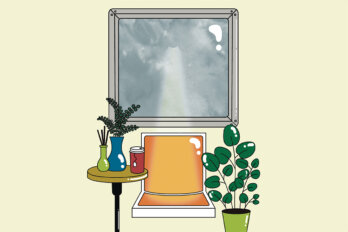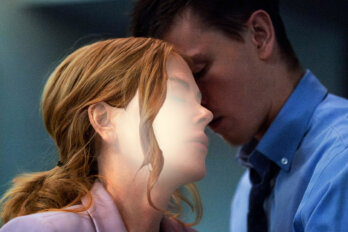I was watching Jane Campion’s The Power of the Dog. Rose, played by Kirsten Dunst, gets married at the beginning of the movie. She is travelling with her new husband to his ranch. She carries a box with her wedding cake in it. She stops to leave a piece with her son. Then it rides in the back of the car, untouched. She doesn’t get a piece of it herself. She is too nervous and distraught by the presence of her twisted, oppressive brother-in-law to take a bite of anything.
Funnily enough, it was while watching Dunst in Sofia Coppola’s Marie Antoinette that I began paying attention to the ways female directors present food in their films. Marie Antoinette is sent to France as a petite fourteen-year-old girl. When she is stripped naked at the border, she is made to understand that she is a possession, a trinket for France to do with what it will. When two of the aristocratic women from court see Marie Antoinette for the first time, they describe her as looking like “a little piece of cake.” She is a commodity, meant to be consumed.
Coppola brought her costume designer, Milena Canonero, a box of macarons to inspire the palette. In the scenes that detail Marie Antoinette’s social ascendance and notorious decadence, there are always cakes and sweets around. She is always surrounded by her ladies-in-waiting, their dresses making them look like layered cakes themselves, as they pop macarons in their mouths and drink champagne.
There is an inordinate amount of sweets in films directed by women. Even the chaotic world of erotic dancers in Janicza Bravo’s Zola has its characters sucking delectable lollipops in the most perilous of situations. There is a fixation on treats that are forbidden by diets. It’s as though the world, constructed of what women have been denied, looms all around them. The thing about cake is that it is almost impossible to eat tidily. You get whipped cream and icing all over your lips. There is something indecent about it. It brings to mind the act of oral sex.
In the end, Marie Antoinette is scorned everywhere for her hedonism and rumoured sex life. (People even claimed she had been having sexual relations with her young son.) As though a woman having a really good time were evidence of sexual impropriety. She is convicted and beheaded, and the depth of her wickedness is summed up in the apocryphal statement that’s followed her ever since: Let them eat cake.
Once, when I was fifteen and had run away from my Montreal home, I found myself in the back of a police car. I had been picked up in New England and was being driven back to the Canadian border. The police officers were talking to each other. I was staring out the window, resenting my situation. I remember one of the officers suddenly looking in the rear-view mirror. “Do you want to stop for an ice cream?” he asked.
I was surprised. He was addressing me as though I was a child, which I was. But I did not think of myself as a child.
I was also very hungry. But I could not accept ice cream from these police officers. The idea of standing outside an ice cream shop eating ice cream with two police officers seemed too crazy to me. What in the world would we talk about? I couldn’t imagine the scene being anything other than painfully awkward.
I also did not want to accept the ice cream on an ideological level. I was, effectively, in a prison. Eating ice cream implies a sort of camaraderie and festivity. The situation was anything but that. I refused to pretend that I wasn’t a prisoner, that I was merely an unhappy girl in the back of a car in need of a small pleasure, as their own children might be.
Also, I did not eat ice cream. I couldn’t remember the last time I had eaten ice cream. When I became an adolescent, I began to develop a disturbing relationship to food. I felt guilty about eating any of it. Food was directly related to home life. And my home life was violent. I didn’t want anything to do with it.
I was so skinny back then. It passed more or less unnoticed because of the times. You weren’t just supposed to look thin in the ’90s; you were supposed to look emaciated. You were supposed to look as though you had crawled out of a basement with your clothes ripped and your eyes smudged. We looked as though we had been murdered, like we were bodies floating in ponds. Those girls were everywhere in the movies. I was praised for starving myself.
I have been fascinated by Catherine Breillat’s Fat Girl for years. Fat Girl is a disturbing portrait of two sisters on holiday: Anaïs, who is thirteen, and Elena, who is fifteen. Elena is conventionally pretty and thin. She weaponizes her physical attractiveness against Anaïs. Elena reminds Anaïs that she is overweight, that her eating is disgusting. Elena has sex in their shared bedroom, to Anaïs’s great disturbance.
Anaïs is the one with inner beauty and a peculiar inner life. She sings a devastatingly pretty made-up lullaby about aching loneliness and boredom. Anaïs eats throughout the movie. She indulges in a banana split. The choice of the banana split is so childish, it reminds the audience that she is being forced to leave the realm of childhood, with its blissful lack of self-consciousness, behind. In childhood one can exist without knowing whether they are attracted to the opposite sex. Anaïs continues to eat candy like a child despite her new adolescence. She eats to exist. She eats to calm herself. She eats to reclaim her identity.
Her layers of fat are beautiful and sweet. She wants only to be told she is desirable for who she is—instead of making concessions, instead of putting herself on a sort of emotional diet.
In the end, as it is a Breillat film, both girls are subjected to violence by men. Violence comes regardless of whether one is thin or fat. They are both at the mercy of the vulnerability that comes with being in the body of a pubescent girl. It’s their vulnerability that attracts the predators, not their beauty.
Or perhaps there is another moral to this story: that, no matter what your shape, you will become miserable in it after you are scorched by the male gaze for the first time.
I had always looked on turning eighteen as freedom. There would be no one to abuse me, no one to force me to do anything I didn’t want to do. At eighteen, I’d have rights. Or, in any case, the police would no longer have the right to take me off the street and bring me back to live with my father.
In college, I was happy. I had always liked school and reading, and I was away from home! I got most of my clothes from the thrift store. I dressed up every day. I liked to look like a flower girl at the turn of the century or a male prostitute from the Edwardian era. I went out dancing in shabby little bars on Saint Laurent Boulevard. I sipped magic mushroom tea in smoky living rooms and recited monologues from Samuel Beckett plays. I had dozens of boyfriends.
My friends all worked in restaurants. They came home with leftover doughnuts. It was marvellous. I existed entirely on cake and pastries. There were doughnuts with cream for breakfast, brownies for lunch, and apple tarts for dinner. Every day was my unbirthday, according to the Mad Hatter calendar I was following.
My favourite New Wave film is from Czechoslovakia and was directed by Věra Chytilová. How to describe Daisies? Two young women, both named Marie, are on the cusp of adulthood. The Maries spend their days discussing absurdist philosophy in their ramshackle apartment or at the beach.
They are always ravenous. They are insatiable. They eat throughout the movie. They eat in bed and in the bathtub. They eat when they are walking. Each day they find an older man to take them out to dinner. They order massive amounts of food and cake. They drink wine as though it were water. When the meal is over, they walk the man to the train station and give him the slip through some childish antics.
Any man who falls for them is ridiculed, both for his pathetic attraction to their bodies and for his disregard for their selves. They consume instead of being consumed.
The movie culminates with the girls encountering a banquet table laden with food. They eat fistfuls of cake. They dance on the furniture, stepping in plates and knocking over dishes. Whatever they can’t consume, they destroy. The Maries’ treatment of and attitude toward food was seen as the most transgressive aspect of this irreverent, iconoclastic film upon its release. In 1968, the film was banned in its home country because of all the waste.
Womanhood was a terrible revelation for me. I accidentally became a young mother. I had always been poor, but having a baby forced me to go from a happy bohemian penury to experiencing the true difficulties of poverty. It was as though I had been eating the candy cabin in “Hansel and Gretel” only to have the witch come out furious. And the witch whose art had been pilfered was me.
I struggled to put food on the table. I no longer ate sweets for breakfast, sweets for lunch, sweets for dinner. My daughter and I ate at small food bank restaurants. I would pay something like three dollars for dinner, and my child would eat for free. We sat at our own little table. Sometimes another single mother with her child would join us.
I was enormously sad that I had to make such a sacrifice, that sacrifice was what motherhood entailed. As women, we give up so much, as though we were ourselves made up of cake that we cut into pieces and hand out to hungry mouths. Soon, it can feel like there is nothing left of yourself. But I was working toward something spiritually nourishing: a career, a place in the world. All so I could get out of poverty. All so I might one day have my own cake again.
I went to see Greta Gerwig’s Little Women even though I’d always had mixed feelings about Louisa May Alcott’s novel. I’d always found those girls to be such goody-two-shoes who constantly moralized and were overly concerned with domesticity and their father’s approval. I was attracted to the character of Jo, who swears never to marry so she can devote her life to being a writer. But, by the end of the novel, even she ends up marrying a pompous older mansplainer.
The sister who grated on my nerves the most was Beth. She is so obsessed with the poor and with doing good that it seems weirdly pathological. I thought the sisters should all tell Beth to snap out of it. She was anorexic, in a way. She was depriving herself of time, of joy, of excess, of disobedience, of rebellion. She embodied a form of femininity as self-destruction and renunciation. She brings food to an ailing poor family and contracts scarlet fever. She wants to be so selfless and so desires to nourish others that it leads to her death.
In the movie, Beth still grated. But Gerwig makes it clear that Jo’s marriage in the book was simply there at the insistence of Alcott’s publisher. In the last scene, Jo is carrying a cake across the lawn of her house. The scene is intercut with images of her book being manufactured. She stayed true to her dreams, unlike her sisters, each of whom had an artistic dream that went unrealized. Jo gets to have her cake and eat it too.
Lulu Wang’s The Farewell is centred around eating with family. Billi, who immigrated to New York when she was a child, goes back to China to visit her grandmother, who has stage-four lung cancer. The gathered family sits around enormous tables throughout the film, in kitchens and restaurants and banquet halls. They enjoy a happy meal surrounding her grandfather’s grave, passing treats to one another. Billi is exposed to her family’s complicated rituals through communal eating.
I never liked Christmas dinners at home growing up. They were always the scene of great discord and arguments. So, after my father passed away, I more or less gave up on them. My daughter has always been so much more social than me. One year, she announced that she had invited people over for Christmas dinner. Strays, she called them. Anyone she knew who was separated from their family. Anyone she knew who didn’t celebrate Christmas.
We ate crowded around my living room table, with mismatched plates and wine in glasses with decals of tigers on them. And everyone laughing. And nobody fighting. And nobody feeling imprisoned, as though they were there because of some obligation, feeling that they were in the wrong house with the wrong people. Everyone brought some sort of dessert. Everyone must have wondered what I would like them to bring, and I was delighted that they had all selected cake. They knew about my reverence for cake and wanted to please me. How sweet! There were cakes all over the table. They were clustered like a fairy tale village, covered in pink roses and blue ribbons.
And I thought, This is what a family dinner feels like. It’s the feeling of being full.
As a child, I felt as though I did not deserve sweets. The world and everything it had to offer was not mine for the taking. I did not deserve a place at the table of life. Women are always told to tame their desires, to stifle their appetites, to not look gluttonous, to not take up space. We are to make sure our children are fed but to abstain ourselves. We are put on spiritual diets from the age we become conscious that society has deemed us women.
Like Gerwig’s Little Women, I also see a book as a magnificent, well-earned cake. My latest novel, When We Lost Our Heads, is filled with women stuffing their mouths with cake. They are a group of women in turn-of-the-nineteenth-century Montreal who, despite all the Victorian restraints put upon them, have decided to be decadent and lead lives filled with excesses of one kind or another. They take heaping seconds even when they are not offered. Similar to Coppola’s Marie Antoinette, they announce with darkened lips, Let us eat cake.




